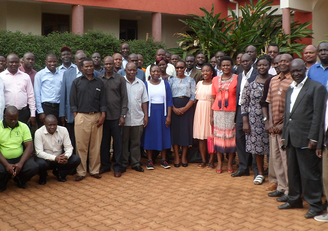CapNex is an acronym for Capacity building on the Water-energy-food security (WEF) nexus through research and training in Kenya and Uganda. The project was motivated by the fact that supply of water, energy and food requires the same resources that act in an interlinked manner. For instance, land can be used to grow firewood or food crops and for both inputs, water is required. The same water can be used to generate energy, irrigate crops, and be used for drinking and domestic purposes. There is thus high pressure exerted on these resources due to multiple uses, which calls for sustainability in their use. A multi-disciplinary approach involving different sectors and stakeholders was adopted to examine the WEF nexus. This was achieved through research by students from four universities which included Technische Universität Vienna (Austria), University of Natural Resources and Life Sciences | BOKU Vienna (Austria), Makerere University (Uganda), and the Technical University of Kenya - with direct involvement of communities in the Sio-Malaba-Malakisi river basin (SMMRB).
After an introduction by Associate Prof. Jeninah Karungi (Makerere University) presentations on the findings on water quality analysis of the SMMRB, assessment of the current and future land use/cover of the SMMRB, adoption of soil and water conservation technologies, and improved nutrient management in agriculture were presented by Mr. Nathan Muli (TU Kenya), Mr. Stanley Chasia (TU Kenya), Dr. Alice Turinawe (Makerere University), and Dr. Allan Komakech (Makerere University), respectively.
The workshop was attended by 69 members, of which 59 were invited stakeholders who came from the districts of Tororo (Uganda), Busia (Uganda), Namisindwa (Uganda), Bungoma (Kenya) and Busia (Kenya); and ten were staff (3) and students (7) (from Uganda and Kenya) on the project.
The reaction session was led by Dr. Allan Komakech. In this session, the views of the participants in regards to the presentations and findings of the project were of main interest. Focus group discussion was used as a means of capturing responses from the participants. A total of six (6) focus groups were formed and members present were assigned randomly to these groups. The guiding questions of the plenary discussions were as follows:
- What recommendation would you give on promoting adoption of soil and water conservation?
- Recommendations for policy on water quality, soil erosion, soil and water conservation?
- Recommendations on promoting vermicomposting and biogas production?
Read the full report for a more comprehensive summary including the major findings of the stakeholder workshop.

